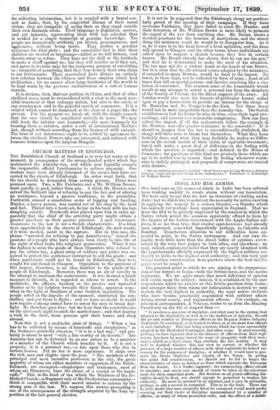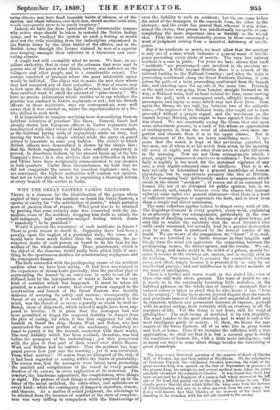INDIA AND HEB. ARMIES.
Oun brief note on the causes of alarm in India has been referred to as tending unduly to create alarm without any foundation. We have only to say that we had no intention of exciting undue fears ; but we did desire to point out the necessity for active exertion in applying the remedy to a serious blunder,—a blunder which has scarcely yet perhaps been appreciated in England. That we were the first to be gravely impressed by the manner in which the Native rebels seized the occasion apparently offered to them by the dispute of the Indian Government with the Angle-Indian sol- diers, is so far from true, that similar apprehensions had already been expressed, somewhat imperfectly perhaps, in_ Calcutta and Bombay. Treacherous allusions to our difficulties have ap- peared in print, in the Native newspapers. And our own re- marks were little more than the direct reflex of -opinions enter- tained by the very best judges in both cities, and elsewhere ; we may, indeed, express our belief that they are nearly identical with the apprehensions officially expressed by the highest military au- thority in India to the highest civil authority ; and this very post brings further corroboration from quarters where the best intelli- gence must be sought.
The practical point to which we are aiming is the reorganiza- tion of our Armies in India—both the British force, and the native regiments. We are quite aware that much difference of opinion still exists upon the subject ; indeed, it is established by the cor- respondence which we receive on this fertile question from India ; and amongst those from whom our information is derived we may include the very highest in authority, the most active civilians who have become practically acquainted with military affairs during recent events, and regimental officers. For example, an esteemed correspondent, A Veteran, writes to us from the Bombay Presidency on the 4th of August thus:— "It involves a question of discipline, and what may be the system best adapted to the disposition as well as to the traditions of Asiatics. Should the prc sent number of European officers in the Regular Native Infantry Regiments be continued, or be limited to three, or at the most.four officers to each battalion? This last being a system which has been successfully adopted in the Hydrabad Contingent, and other corps. It need scarcely, perhaps, be here repeated that to the absence of officen3 from their regi- ments, has been by many traced the want of sympathy with their men; and to which as a chief cause they attribute the late mutiny. It may well he doubted whether this last view be correct, or whether the presence of a large number of officers with their regiments be indeed ne- cessary for the purposes of discipline, or whether it would tend to pro- mote the future obedience and loyalty of the Sepoy. In giving this point full consideration, we should not be led to forget the characteristics of races so distinct as those which separate the European from the Asiatic. In a Native regiment, the commanding officer should be absolute; and every care should of course be taken in the selections made for these important posts. His decision on all points affecting dis- cipline should be final, nor should appeals be permitted to weaken his authority. He must be assisted by an adjutant, and it may be.advisable, perhaps, to add a second in command. This to be the limit. There can be little doubt that men naturally fitted for command would much prefer carrying out their views of discipline unencumbered by a number of officers, on many of whom protracted exile, and the effects of a debili-
tiding climate, may have fixed incurable habits of idleness, or of dis- sipation, and whose influence over their men, should another crisis arise, would consequently prove to be purely imaginary."
Indeed, we have far from exhausted the innumerable reasons why active steps should be taken to remodel the Native Indian Army, and to readjust the system on such a footing as would shut out the evils resulting from the indiscipline engendered in the Native Army by the alien habits of the officers, and in the British Army through the licence claimed by men of a superior race ranging amongst their inferiors in a luxurious and ener- vating climate. A single fact will exemplify what we mean. We hear, on ex- cellent authority, that in some of the columns that were sent to pursue one of the great rebel chiefs, torture was inflicted on the villagers and other people, and to a considerable extent. The torture consisted of pressure where the most intolerable agony would be inflicted. The object was to make-the men show where they had concealed any of their valuables. It was of course easy to look upon the villagers in the light of rebels, and the valuables thus extorted went to swell the amount of " prize-money." We have no precise information which enables us to say whether the practice was confined to Native regiments or not; but the British officers in those regiments, says our correspondent, were well aware that it was carried on, under the superintendence of a Na- tive skilled in such work.
It is impossible to imagine anything more demoralizing than an habitual tolerance of practices like these. General Jacob had already shown how European officers in Native regiments were familiarized with other forms of indiscipline,—such, for example, as the habitual laying aside of regimentals while on duty, and leaving the watch to a single sentmel while the party on guard retired to luxuriate in some easy fashion. The extent to which British officers were demoralized is shown by the -simple fact; that the British regiments in India also suffered corporately is proved, in disastrous fashion, by the present break-up of the late Company's force ; it is also obvious that our difficulties in India. and China have been reciprocally communicated to our enemies in both quarters. Under these circumstances, we hold that we did not exaggerate the causes for ceaseless vigilance ; and, we are convinced, the highest authorities will confirm our opinion, that not an hour should be lost in organizing a thorough reform of every branch of the service in India.



























 Previous page
Previous page